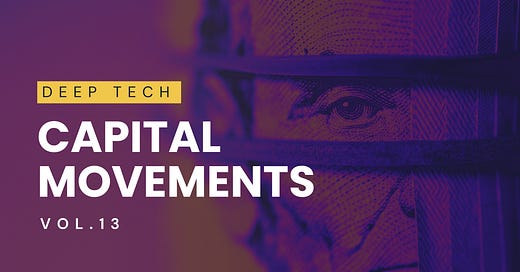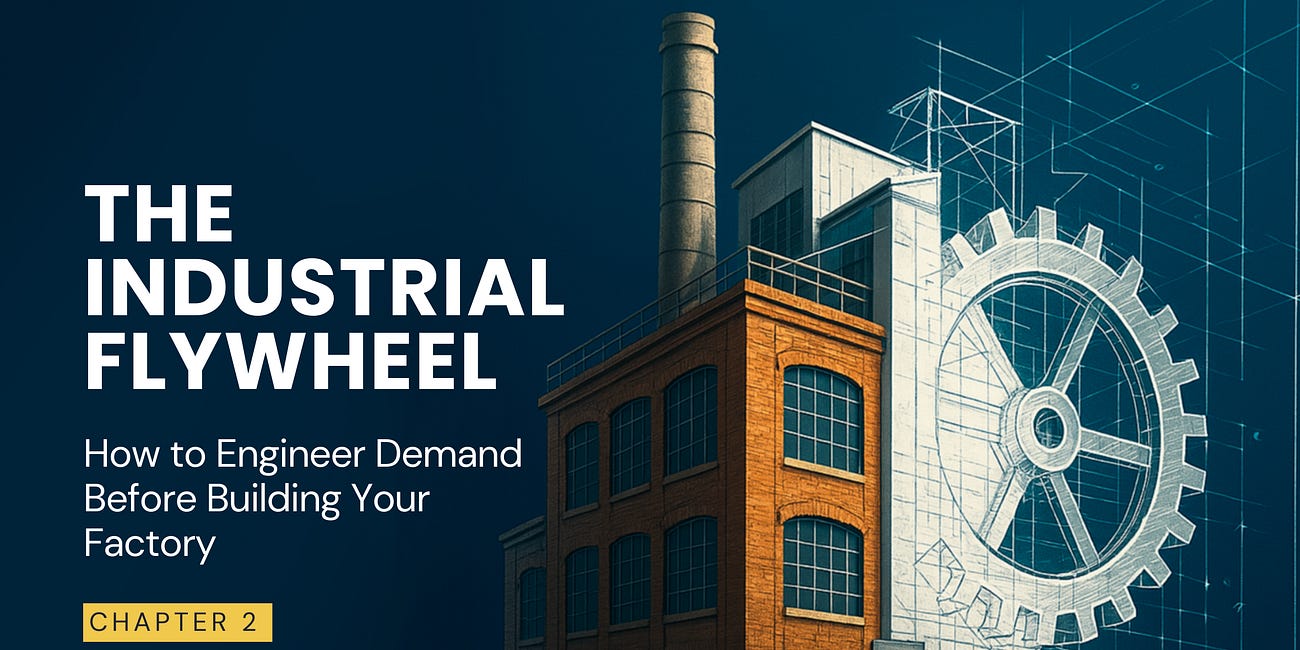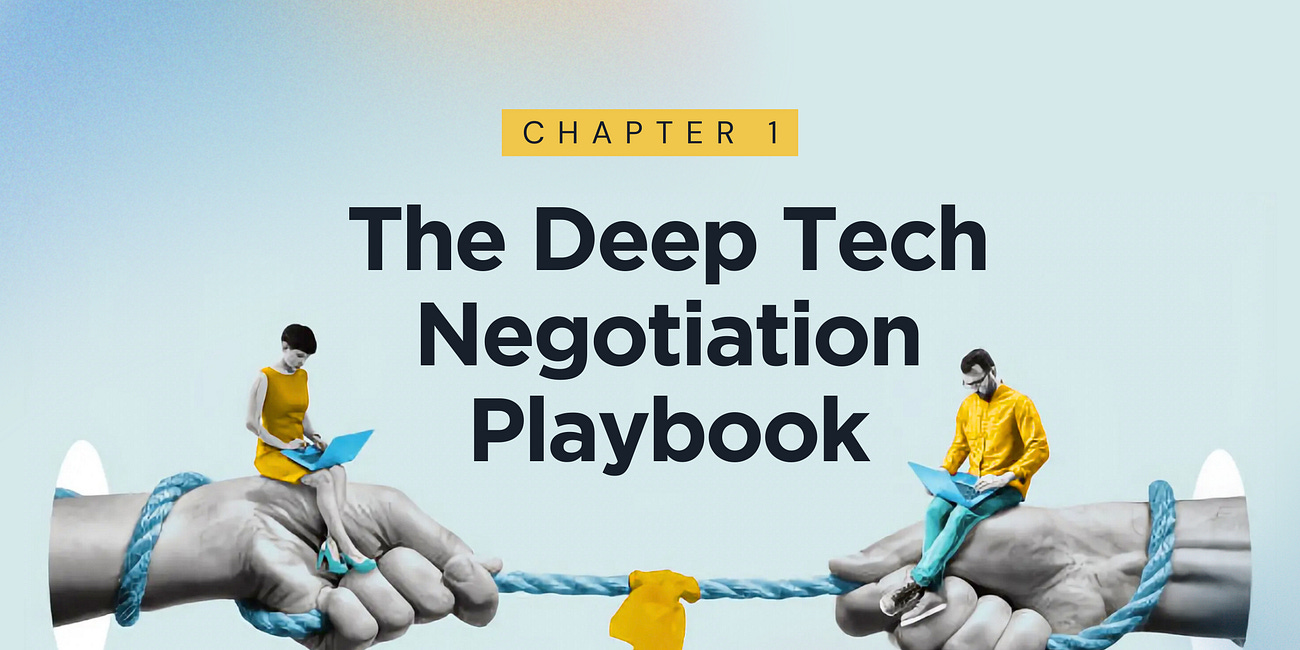Founders Fund’s $4.6B Is Live, Advanced Artificial Intelligence Got $2B—and That’s Just the Surface | Capital Movements Vol. 13
💰The state of deep tech capital: who’s raising, who’s betting, and why.
Welcome back to Deep Tech Capital Moments! Every week, we track funding rounds, new funds, and major strategic moves in deep tech
💡 Got a big deal to share? If your fund just backed something game-changing—or your startup just raised—let’s make sure the right people see it.
✨ For more, see Membership | DeepTech Catalyst | DeepTech Briefing | Venture Guides
Before Go Ahead:
Deep Tech Capital Movements is just one part of The Scenarionist experience. To enjoy the full experience, become a Premium Member!
The Scenarionist Premium is designed to make you a better Deep Tech Founder, Investor, and Operator. Premium members gain exclusive access to unique insights, analysis, and Venture Guides with the wisdom of the world’s leading Deep Tech thought leaders. Invest in yourself, and upgrade today!
Dear Friends,
This week was dense. Not loud, not frantic—just dense with signals. Signals of a market that’s learning to prioritize again. Signals of investors asking deeper questions. Signals that something more structural may be taking root beneath the noise.
Yes, there were the usual supernovas—$2B whispers around Thinking Machines, another $2B confirmed for Safe Superintelligence. You can’t ignore that kind of gravity. But those weren’t the stories that mattered most.
Not this time.
What stood out was what happened underneath the headline layer: a quiet consolidation of effort around foundational systems. Energy infrastructure, industrial robotics, surgical tooling, cybersecurity automation, and carbon-material circularity all saw meaningful movement—not in rhetoric, but in capital.
Across the board, we tracked more than 45 deep tech deals this week—ranging from edge hardware and electrochemical systems to manufacturing replatforming and autonomous infrastructure.
The majority of activity sat squarely in the Series A tier, suggesting that venture capital is finding renewed appetite for companies that are past the proof-of-concept stage but not yet ready for the capital intensity of hyperscaling. Seed rounds followed closely, particularly in Europe and the UK, where bets were placed on platforms that blend computational simulation with hard science—magnetic sensors for wearables, microbial inputs for agriculture, and AI-powered textile scanners. Later-stage rounds were fewer, but when they happened, they came with weight: $100M+ checks going into battery factories, robotic surgery platforms, and distributed grid systems.
Geographically, the center of gravity was again North America, which captured nearly $2.9 billion in disclosed funding. A large portion was concentrated around AI infrastructure and computational biology, but what emerged more quietly were large-scale moves in distributed energy networks, semiconductors, and emergency robotics.
Europe, by comparison, showed a more measured yet equally deliberate pace. The region emphasized precision over scale—focusing on materials science, biotech tooling, and sustainability-linked industrial platforms. This isn’t a disparity so much as a divergence in strategy. Where North America continues to lean into scale and platformization, Europe appears to be anchoring its bets in applied research, regulated markets, and system-level re-engineering.
Take photonics, for instance. nEye Systems raised $58 million to industrialize wafer-scale optical switches—a deep infrastructure solution designed to relieve the growing stress of data movement in AI inference. With backing from CapitalG, Nvidia, and Microsoft’s M12, this wasn’t just a vote of confidence in a startup—it was an early indicator of how next-generation compute layers will shift from electrons to photons. Or consider Base Power, a Texas-based battery infrastructure startup that raised $200 million to scale out its residential grid and begin production on its own battery systems.
In robotics, Brinc’s $75 million raise paired with a strategic partnership with Motorola was more than a capital event—it was a deployment signal. The company is building a nationwide network of drones for real-time emergency response, with autonomous dispatch, live ops, and integration into first responder ecosystems.
And on the industrial continuity front, AMCA emerged from stealth with $76 million in financing to restore America’s aerospace and defense manufacturing supply chain. Instead of building a single product, it’s acquiring and modernizing a network of legacy suppliers. The startup is less a lab than a machine shop writ large—bringing software sensibilities to hardware resilience.
Materials innovation added its own weight this week. Simplifyber’s $12 million raise underscored a new mode of production in textiles—one that bypasses weaving, knitting, or cutting in favor of direct 3D-molding from natural fiber liquids. Their process doesn’t just reduce waste—it eliminates entire categories of labor and tooling. In parallel, UK-based Matoha secured £1.5 million to scale its handheld AI-powered fiber scanners for circular fashion.
Health and biotech investments also moved beyond molecule discovery into platformized delivery and diagnostics. Vaxess’s $9 million round will take its microneedle-based patch system into broader GLP-1 drug delivery, replacing cold chain logistics with temperature-stable, wearable pharmaceuticals. And Imbria Pharmaceuticals landed $57.5 million to scale a cardiometabolic drug that modulates cardiac energy efficiency through pFOX inhibition—a metabolic rather than molecular approach to therapeutic action.
Cybersecurity saw systems integration take precedence over threat dashboards. Outtake, based in New York, raised $16.5 million to automate breach response with AI-driven runbooks that compress incident timelines from hours to minutes.
Moreover, Remedy Scientific emerged from stealth with $11 million in seed funding to automate land remediation. The company’s mechatronic platform—equipped with advanced sensing and algorithmic optimization—targets contaminants like PFAS directly at the source, reducing treatment times from decades to days. It's not just a cleanup tool—it’s a way to unlock billions in underutilized land assets across the United States, converting environmental risk into recoverable economic potential.
Meanwhile, Europe gave us a glimpse of what strategic circularity looks like at scale. UP Catalyst, based in Estonia, secured €18 million from the European Investment Bank to expand its molten salt electrolysis process, which turns industrial CO₂ emissions into battery-grade graphite. The goal? Supply 50% of Europe’s graphite gap by 2030—turning waste into resilience, emissions into energy storage.
In parallel, fund activity signaled where long-term conviction is starting to concentrate. Founders Fund closed its largest vehicle yet—a $4.6 billion growth-stage fund backing scaled frontier players like SpaceX, Stripe, and Anduril—while Andreessen Horowitz is reportedly raising a $20 billion megafund to anchor the next wave of AI infrastructure. On the earlier end, Lerer Hippeau raised $200 million to maintain its edge in seed, Revent launched a €100 million thesis-driven fund focused on planetary health, and Osney Capital secured $64 million to support cybersecurity platforms built for an increasingly volatile digital landscape.
What connects all of these examples is not the sector or even the technology—it’s the orientation toward necessity.
These are not lifestyle startups.
They are systems.
Designed to function, scale, and remain standing when others don’t.
When capital flows into these domains, it doesn’t chase virality—it chases leverage. And leverage, this week, looked like semiconductors you can’t see, patches that don’t need refrigeration, drones that launch without a pilot, and fibers that never see a loom.
The deeper story, as always, isn’t just who raised—it’s what got built. This week made it clear that deep tech is rewriting the infrastructure of the 21st century—one protocol, one process, one power cell at a time.
Enjoy the read,
Giulia and Nicola
The Industrial Flywheel: How to Engineer Demand Before Building Your Factory | Chapter 2
If you're building in deep tech, you already know: you don’t get the luxury of launching with code and scaling with servers.
You're dealing with physical products. Real-world physics. Factories that cost millions—before your first unit ever ships.
So, how do you create market pull before your production line even exists?
In Chapter One, we reframe go-to-market for industrial founders—not as a late-stage effort, but as a core part of your R&D strategy. We show you how to align with pilot partners, investors, and regulators before the concrete is poured. How to turn demand signals—MOUs, LOIs, early pilots—into levers for traction and capital.
In Chapter Two, we take you inside the pilot phase: how to fund it, structure it, and use it to cross the credibility gap between prototype and full production. You'll learn how to turn a successful test into real-world adoption, contractual commitments, and investor-grade data—while avoiding the traps that kill momentum during scale-up.
Whether you’re pioneering advanced materials, quantum sensors, synthetic biology platforms, or next-gen robotics, the principle stays the same: you must engineer the demand while you engineer the technology.
So...What if your factory could sell before it exists?
Startups Deals
🔸 illumicell AI Raises $2M Pre-Seed to Launch Real-Time Male Fertility Diagnostics
illumicell AI, a real-time diagnostic platform for male fertility, raised $2M in pre-seed funding from KOFA Healthcare, MedTechSyndicates, and Harvard Phoenix. The company is building a portable lab scanner for semen analysis, enabling fast and personalized fertility insights.
Deal: Pre-Seed
Region: U.S.
Industry: Health Tech
Sector: Fertility Diagnostics
Tech: AI, Fluid Biopsy
🔸 Enpal Secures €110M Equity Round to Expand Clean Energy Solutions
German green energy tech provider Enpal raised €110M in equity funding to expand into new markets and launch an energy trading platform. The round was led by US private equity firm TPG, alongside existing backers. This is the company’s first equity raise since 2023, following a €1.1B debt vehicle secured last year to fund customer installations of solar panels, batteries, and heat pumps.
Deal: Growth Equity
Region: Germany, Europe
Industry: Energy Tech
Sector: Residential Clean Energy
Tech: Solar, Battery, Energy Trading
🔸 Thinking Machines Reportedly Targeting $2B Seed Round Amid AI Frenzy
Former OpenAI CTO Mira Murati’s new venture, Thinking Machines, is reportedly raising a staggering $2B seed round—potentially the largest in tech history. The startup, shrouded in secrecy, aims to build customizable, capable AI systems and is stacked with OpenAI alumni including John Schulman and Alec Radford.
Deal: Seed
Region: U.S.
Industry: AI
Sector: Foundation Models / Infra
Tech: AI Systems, AI Customization
🔸 Zero Industrial Raises $10M to Decarbonize Industrial Heat
Charleston-based Zero Industrial raised $10M in Series A funding led by Evok Innovations to deploy its thermal energy storage (TES) systems for industrial heat decarbonization. The company provides Heat-as-a-Service solutions, eliminating fossil fuel use in industrial facilities across North America.
Deal: Series A
Region: U.S.
Industry: Climate Tech
Sector: Industrial Decarbonization
Tech: Thermal Energy Storage, Heat-as-a-Service
🔸 Solu Therapeutics Closes $41M Series A to Advance CyTAC Oncology Platform
Boston-based Solu Therapeutics secured $41M in Series A funding to support its CyTAC™ platform and initiate a Phase 1 trial of lead candidate STX-0712 for chronic myelomonocytic leukemia (CMML). The round included Eli Lilly, Biovision Ventures, Pappas Capital, and The Leukemia & Lymphoma Society, among others.
Deal: Series A
Region: U.S.
Industry: Biotech
Sector: Oncology
Tech: CyTAC, TicTAC, Targeted Cell Depletion
🔸 Remedy Scientific Raises $11M to Automate Land Remediation
Remedy Scientific emerged from stealth with $11M in seed funding to revolutionize land remediation through automation. The round was led by Eclipse, with participation from Refactor, Cantos, and BoxGroup. Remedy’s platform uses advanced sensing and algorithmic optimization to treat contaminants like PFAS directly onsite—cutting remediation times from decades to days. With a scalable, product-based approach, the company aims to unlock billions in underutilized land assets across the U.S.
Deal: Seed Round
Region: United States
Industry: Industrial Tech
Sector: Infrastructure, Environmental Engineering
Tech: Automation, Sensing, Mechatronics, PFAS Destruction
🔸 Nuro Raises $106M at $6B Valuation in Series E to Scale Licensing of Autonomous Tech
Autonomous vehicle leader Nuro raised $106M in Series E funding at a $6B valuation. The round includes top institutional investors and underscores confidence in Nuro’s driver-out Level 4 platform and licensing model for robotaxis, commercial fleets, and consumer vehicles.
Deal: Series E
Region: U.S.
Industry: Autonomous Tech
Sector: Mobility / Robotics
Tech: AI, L4 Autonomy, Platform Licensing
🔸 Matoha Secures £1.5M to Scale AI-Powered Textile Scanners
UK-based Matoha raised £1.5M in seed funding to scale its AI-powered handheld scanners for textile recycling. The scanners identify fiber composition in under a second, helping the circular fashion industry sort and repurpose materials more efficiently.
Deal: Seed
Region: UK, Europe
Industry: Sustainability
Sector: Fashion / Recycling
Tech: AI, Material Scanning
🔸 Brinc Raises $75M and Partners with Motorola to Scale Emergency Response Drones
Seattle-based public safety drone company Brinc raised $75M in new funding led by Index Ventures, with participation from Motorola, which also formed a strategic distribution and integration partnership. The funds will support R&D, manufacturing, and Brinc’s nationwide emergency drone network.
Deal: Series Unknown
Region: U.S.
Industry: Robotics
Sector: Public Safety / Emergency Response
Tech: Drones, LiveOps, Autonomous Dispatch
🔸 Aelius Biotech Raises £750K to Expand Animal-Free Testing Platform
UK-based Aelius Biotech raised £750K to scale its gut simulation platform for animal-free testing in food and drug development. The company’s in vitro model uniquely simulates all three stages of digestion and is used by clients such as Huel and lab-grown meat firms.
Deal: Funding Round
Region: UK, Europe
Industry: Biotech
Sector: In Vitro Testing
Tech: Digestive Simulation, Animal-Free Testing
🔸 Caris Life Sciences Raises $168M for Precision Oncology Expansion
Caris Life Sciences raised $168M to expand its precision oncology platform, following FDA approval of its MI Cancer Seek test. The round was led by Braidwell and includes Perceptive, Millennium, and others, bringing Caris’ total funding to $1.86B.
Deal: Growth Round
Region: U.S.
Industry: Biotech
Sector: Precision Medicine
Tech: Companion Diagnostics, Genomics, AI
🔸 nEye Systems Secures $58M Series B for Optical Switches to Power AI Infrastructure
Silicon photonics startup nEye Systems raised $58M in Series B funding to scale its wafer-scale optical switch technology. The round was led by CapitalG and joined by Nvidia, Microsoft’s M12, and Micron. nEye’s tech addresses data bottlenecks in AI workloads with ultra-fast, low-power light-based switching.
Deal: Series B
Region: U.S.,
Industry: Deep Tech
Sector: AI Infrastructure
Tech: Silicon Photonics, Optical Switching
🔸 Merida Biosciences Launches with $121M to Target Pathogenic Antibodies in Autoimmune Diseases
Cambridge-based Merida Biosciences launched with $121M in Series A financing to develop precision immunotherapies targeting disease-driving antibodies. The company’s lead candidate focuses on Graves’ disease, and its platform is backed by Bain Capital Life Sciences, Third Rock Ventures, and others.
Deal: Series A
Region: U.S.
Industry: Biotech
Sector: Immunology / Autoimmune
Tech: Fc Therapeutics, Antibody Depletion
The Deep Tech Negotiation Playbook | Chapter 1/4
Every transaction in private markets emerges from that delicate dance between money and ideas.
As Irish playwright Sean O’Casey once observed, “Money doesn’t make you happy, but it calms your nerves.”
Whether you’re an entrepreneur on your hundredth late-night sprint or a researcher sequencing genes in a borrowed university lab, it’s hard to dismiss the power of money to soothe those nerves—if only for a moment.
How does an aspiring Deep Tech founder persuade the right investor to come on board with fair terms and a shared vision for the future?
Timelines for new materials, medical devices, or advanced robotics often extend years beyond those of a typical software startup. The scientific risk is also exponentially higher. A fusion reactor cannot be spun up in six weeks. The unique nature of this sector—where “slow burn meets big bang”—demands a negotiation approach that transcends a simple list of bullet points on a term sheet.
We have gathered insights from investors and founders at the frontier of scientific innovation. Consider this your blueprint for building unstoppable momentum—from the lab bench to the boardroom.
🔸 RayThera Launches with $110M Series A to Develop Small Molecule Immunotherapies
San Diego-based biotech startup RayThera raised $110M in Series A funding led by Foresite Capital and OrbiMed to support early clinical development of its small molecule programs in immunology. The company will use the capital to advance multiple candidates into Phase 1 trials.
Deal: Series A
Region: U.S.
Industry: Biotech
Sector: Immunology
Tech: Small Molecule Drug Discovery
🔸 Simplifyber Raises $12M Series A to Revolutionize Sustainable Soft Goods Manufacturing
Materials innovation startup Simplifyber raised $12M to scale its 3D-molding tech for biodegradable textiles. Led by Suzano Ventures, the round supports expansion in fashion, automotive, and consumer goods using Fybron™, a natural fiber liquid that eliminates spinning, weaving, and sewing.
Deal: Series A
Region: U.S.
Industry: Materials Science
Sector: Bio-Based Manufacturing
Tech: 3D Molding, Sustainable Fibers
🔸 Outtake Raises $16.5M Series A to Automate Cybersecurity Response
NYC-based Outtake secured $16.5M in Series A funding led by CRV, with participation from Bill Ackman and Nikesh Arora. The platform automates incident response workflows in cybersecurity, using AI-driven runbooks to reduce manual intervention and shorten time-to-containment.
Deal: Series A
Region: U.S.
Industry: Cybersecurity
Sector: Automation
Tech: AI, SecOps
🔸 Aiper Receives $100M Strategic Investment from Fluidra to Expand Pool Robotics
Cordless pool cleaning company Aiper landed $100M in strategic investment from Fluidra to support global expansion and innovation in connected pool robotics. The partnership will enhance Aiper’s distribution across Europe and North America and integrate with Fluidra's brand portfolio.
Deal: Strategic Growth Round
Region: U.S., Global
Industry: Consumer Robotics
Sector: Pool & Wellness
Tech: Robotic Cleaning, IoT
🔸 Imbria Pharmaceuticals Raises $57.5M Series B to Advance Cardiometabolic Drug into Phase 2b
Boston-based Imbria Pharmaceuticals secured $57.5M in Series B funding led by Deep Track Capital to launch a Phase 2b trial of ninerafaxstat for non-obstructive hypertrophic cardiomyopathy. The drug shifts cardiac energy metabolism to improve efficiency and function.
Deal: Series B
Region: U.S.
Industry: Biotech
Sector: Cardiometabolic
Tech: pFOX Inhibition, Energy Modulation
🔸 Ottometric Raises $10M Series A to Automate ADAS Validation
Ottometric raised $10M to automate validation of ADAS systems, reducing testing costs and cycle times by over 50%. The Boston startup’s AI platform classifies and distills sensor data from cameras, radar, and lidar to accelerate compliance and performance for OEMs.
Deal: Series A
Region: U.S.
Industry: Automotive Tech
Sector: ADAS Validation
Tech: AI, Sensor Analytics
🔸 Refiberd Receives $300K from eBay to Scale AI for Circular Fashion
Refiberd, a U.S.-based textile recycling startup, secured $300K from eBay Ventures after winning its Circular Fashion Innovator of the Year Award. The company uses hyperspectral imaging and AI to identify and sort fabric composition for textile-to-textile recycling.
Deal: Grant / Non-Dilutive
Region: U.S.
Industry: Sustainability
Sector: Circular Fashion
Tech: AI, Hyperspectral Imaging, Textile Recycling
🔸 Vaxess Raises $9M to Advance Patch-Based Drug Delivery for GLP-1 Therapies
Woburn-based Vaxess raised $9M to expand its shelf-stable microneedle patch platform for delivering GLP-1 drugs like semaglutide. The MIMIX™ patch aims to replace subcutaneous injections with a room temperature–stable band-aid–like patch, reducing patient discomfort and eliminating cold-chain logistics.
Deal: Funding Round
Region: U.S.
Industry: Drug Delivery
Sector: Obesity / Diabetes
Tech: Microneedles, Patch-Based Delivery
🔸 Neuranics Raises $8M to Power Magnetic Sensing in Wearables and XR
Scottish startup Neuranics secured $8M to scale its TMR magnetic sensing tech, enabling ultra-sensitive, contactless tracking for muscle movement and health monitoring. The company is targeting integration in XR, wearables, and digital health, with support from Blackfinch Ventures, Archangels, and university funds.
Deal: Seed
Region: UK, Europe
Industry: Deep Tech
Sector: Human-Machine Interfaces
Tech: Magnetic Sensing, TMR Sensors
🔸 Base Power Raises $200M Series B to Scale Residential Battery Grid
Texas-based Base Power raised $200M from a16z, Addition, Lightspeed, and Valor to expand its distributed home battery network and launch its own battery factory. With 10MWh installed in March alone, the company is building a “virtual power plant” for grid stability across ERCOT and beyond.
Deal: Series B
Region: U.S.
Industry: Energy Tech
Sector: Home Storage / Grid Infrastructure
Tech: Residential Batteries, Grid Services
🔸 AMCA Launches with $76M to Reinvent U.S. Aerospace & Defense Manufacturing
The Advanced Manufacturing Company of America (AMCA) emerged from stealth with $76M from a powerhouse syndicate including a16z, Founders Fund, Lux, and Caffeinated Capital. AMCA aims to rebuild the U.S. industrial base by acquiring and scaling legacy aerospace and defense suppliers.
Deal: Launch Funding
Region: U.S.
Industry: Industrial Tech
Sector: Defense Manufacturing
Tech: Precision Components, Advanced Manufacturing
🔸 Achira AI Raises $33M to Redefine Drug Discovery via Simulation + AI
Greek-founded Achira AI raised $33M to develop a new class of simulation models for drug discovery by combining geometric deep learning, quantum chemistry, and statistical mechanics. Investors include Nvidia, Dimension, Amplify, and Compound.
Deal: Seed
Region: Europe (Greece/U.S.)
Industry: Biotech
Sector: Drug Discovery
Tech: Simulation + AI, Quantum Chemistry
🔸 NOWOS Raises €6M to Scale Battery Repair Hubs Across Europe
Dutch startup NOWOS raised €6M in equity to expand its lithium-ion battery repair and maintenance network. Serving e-mobility players like Dott and Voi, NOWOS repairs 90,000+ batteries per year and will open new hubs in Poland and Germany to meet circular economy goals.
Deal: Funding Round
Region: Netherlands, Europe
Industry: Clean Tech
Sector: Battery Lifecycle
Tech: Repair, Diagnostics, Battery Passport
🔸 UP Catalyst Raises €18M EIB Loan to Scale CO₂-to-Graphite Production
Tallinn-based UP Catalyst secured an €18M venture loan from the European Investment Bank to scale its molten salt electrolysis process, converting industrial CO₂ into battery-grade graphite and carbon nanotubes. The company aims to supply 50% of Europe’s graphite demand gap by 2030.
Deal: Venture Debt
Region: Estonia, Europe
Industry: Climate Tech
Sector: Battery Materials
Tech: CO₂ Conversion, Electrochemical Synthesis
🔸 Xindus Raises $10M Series A to Streamline Cross-Border Logistics for Indian SMEs
Gurugram-based Xindus closed a $10M Series A round led by 3one4 Capital to expand its full-stack logistics platform for global trade. Serving sectors like fashion, wellness, and decor, Xindus integrates shipping, warehousing, compliance, and returns for D2C brands.
Deal: Series A
Region: India, Asia
Industry: Logistics
Sector: Cross-Border Trade
Tech: Supply Chain SaaS, SME Tools
🔸 AgroStar Secures $6.7M from Accel to Expand India’s Digital Farming Platform
Agri-input and advisory platform AgroStar raised $6.7M in funding led by Accel India. The Pune-based startup serves farmers with digital tools across 11 states, enabling improved yields and integrating market access, advisory, and supply via a single platform.
Deal: Growth Round
Region: India, Asia
Industry: Agritech
Sector: Digital Agriculture
Tech: Farm Analytics, B2B2C Platform
🔸 INTAKE Raises $10M+ to Scale Microbial Protein Tech for Alt-Protein Sector
Seoul’s INTAKE closed a KRW 13.5B (~$10M+) Series C round from HB Investment, CJ Investment, and others to scale microbial-based protein solutions. INTAKE is ramping up R&D and international expansion, operating at the B2C and B2B foodtech intersection.
Deal: Series C
Region: South Korea, Asia
Industry: Food Tech
Sector: Alternative Protein
Tech: Fermentation, Microbial Engineering
🔸 AdvancedAg Raises $2M to Expand Indigenous-Led Ag Biotech Across North America
Canada-based AdvancedAg secured $2M in seed funding from Raven Indigenous Capital to grow its microbial agri-input business. The company provides seed, soil, and foliar products to replace synthetic fertilizers.
Deal: Seed
Region: Canada,
Industry: Ag Biotech
Sector: Sustainable Inputs
Tech: Microbial Formulations, Soil Health
🔸 SeafoodAI Secures NEC X Investment for AI-Powered Biometrics in Sustainable Fisheries
Palo Alto–based SeafoodAI raised strategic funding from NEC X to expand its biometric platform for automated seafood traceability. Its flagship CrabScan360 uses AI-powered computer vision to automate sorting and compliance for crab fisheries, with broader applications in aquaculture.
Deal: Strategic Investment
Region: U.S.
Industry: Blue Economy
Sector: Seafood Traceability
Tech: AI, Biometric Scanning, Robotics
🔸 CMR Surgical Raises $200M to Challenge Intuitive with Versius Robot
Cambridge-based CMR Surgical raised $200M+ in equity and debt from SoftBank, Trinity Capital, and others to expand its Versius robotic surgery system. With over 30,000 procedures completed, the company is aggressively entering the U.S. market to challenge incumbent Intuitive.
Deal: Series D Extension
Region: UK, Europe
Industry: MedTech
Sector: Surgical Robotics
Tech: Minimally Invasive Systems, Real-Time Data
🔸 EngineAI Raises $28M Pre-A to Scale China’s Next Gen of Humanoid Robots
Shenzhen-based EngineAI secured $28M in pre-Series A funding from Stone Venture, SenseTime, and others. The robotics startup has launched three humanoid models and plans to scale production of its SE01 platform—capable of jumping, flipping, and natural locomotion—at a ~$21K price point.
Deal: Pre-Series A
Region: China, Asia
Industry: Robotics
Sector: Humanoid Mobility
Tech: Bio-Inspired Motion, AI Gait Control
🔸 Blumind Raises $20M Series A to Build Analog AI Chips for Edge Devices
Ottawa-based Blumind secured $20M CAD (~$14.6M USD) in Series A funding to commercialize its low-power, analog AI processor, purpose-built for running full neural networks at the edge. Designed for always-on applications like smart glasses, sensors, and robotics, the chip can store 8-bit values per transistor—drastically reducing power consumption compared to digital alternatives.
Deal: Series A
Region: Canada
Industry: Semiconductors
Sector: Edge AI Hardware
Tech: Analog Neural Compute, Low-Power Inference
🔸 Bliss Raises $17.5M Seed to Bring AI Matching & Previews to Aesthetic Surgery
NYC and Tel Aviv-based Bliss closed a $17.5M Seed round to modernize the cosmetic surgery experience. The platform uses AI to generate personalized previews of aesthetic procedures and match patients with qualified providers. Backed by notable firms and Dr. Miami, Bliss is targeting a $200B+ global market undergoing rapid cultural and demographic shifts.
Deal: Seed
Region: U.S. / Israel
Industry: HealthTech
Sector: Aesthetic Medicine
Tech: Generative AI, Patient Matching, Outcome Visualization
🔸 Surgicure Raises $1.78M to Replace Tape in Airway Management with the ‘Horseshoe’
Boston-based Surgicure Technologies raised $1.78M in Seed funding to bring its patented Horseshoe device to market. Developed by army respiratory therapists and redesigned by the founder, the solution secures ET tubes more reliably than tape—preventing injuries, pressure sores, and up to 30% of avoidable deaths from accidental extubation.
Deal: Seed
Region: U.S.
Industry: MedTech
Sector: Critical Care Devices
Tech: Airway Securement, Emergency Transport, Trauma Innovation
🔸 Unosecur Lands $5M to Redefine Identity Security with Unified AI Fabric
Germany-based Unosecur secured $5M Seed funding (plus $3M in oversubscription) for its Unified Identity Fabric platform. The AI-powered system unifies identity data across human, machine, and AI agents, continuously monitoring for behavioral anomalies in real time. The startup is already in use by 15 large organizations, including a Fortune 500 firm.
Deal: Seed
Region: Germany
Industry: Cybersecurity
Sector: Identity & Access Management (IAM)
Tech: AI Risk Detection, Unified Identity Fabric, Real-Time Monitoring
🔸 Safe Superintelligence Raises $2B at $32B Valuation to Pursue AGI Mission
Safe Superintelligence (SSI), the stealthy AGI startup led by OpenAI co-founder Ilya Sutskever, has reportedly raised $2B at a $32B valuation. The company, founded in 2024 with a singular focus on building a “safe superintelligence”, is backed by Greenoaks and remains tightly under wraps, with no product publicly disclosed to date.
Deal: Growth
Region: U.S.
Industry: Artificial Intelligence
Sector: AGI Research & Safety
Tech: Frontier AI Models, Alignment, Superintelligence Safety
Venture Capital
🔹 Founders Fund closes $4.6B vehicle to back late-stage tech giants
Peter Thiel’s Founders Fund has closed a $4.6B growth-stage fund, its largest to date. Backed by 270 investors and significant GP capital, the fund will support portfolio leaders like SpaceX, Stripe, and defense tech firm Anduril. As tech IPOs stall amid tariff uncertainty, Founders Fund is doubling down on dominant private companies poised to shape the next era of innovation.
🔹 Osney Capital launches $64M fund to back seed-stage cybersecurity startups across UK and Canada
UK-based Osney Capital has raised a $64M fund focused on seed-stage cybersecurity ventures, with a strong cross-border strategy anchored by a new office in Calgary. The fund will target startups tackling national infrastructure threats, quantum-resilient security, and AI-driven defense. Early portfolio includes Mindgard, with backing from British Business Bank, IronGate, and Canadian family offices.
🔹 Revent unveils €100M Fund II to back founders tackling societal and planetary health
Berlin-based Revent has launched its second fund at €100M to invest in early-stage European startups addressing pressing challenges in climate, healthcare, and education. The fund introduces the “Real Value Framework” to quantify a company’s social impact in euros. Backers include EIF, Otto Group, and top European founders. Past investments include Sylvera, Tem Energy, and Avelios Medical.
🔹 Lerer Hippeau raises $200M for ninth seed fund to double down on early-stage bets
NYC’s Lerer Hippeau has closed a $200M oversubscribed Fund IX to continue backing pre-seed and seed-stage founders. Marking 15 years in venture, the firm emphasizes finding “the best founders before they’re famous.” With 400+ companies backed to date, LH remains generalist, while leaning into consumer, enterprise, and AI-led startups. Dozens of portfolio founders joined as LPs.
🔹 Andreessen Horowitz seeks $20B megafund to fuel U.S. AI dominance
VC giant a16z is in talks to raise a $20B AI-focused growth-stage megafund, its largest yet. Targeting global LPs eager to back U.S. tech, the firm plans to double down on portfolio standouts like xAI, OpenAI, and Databricks. The raise reflects soaring capital demands for compute-heavy AI models, as well as a16z’s expanding geopolitical influence.












